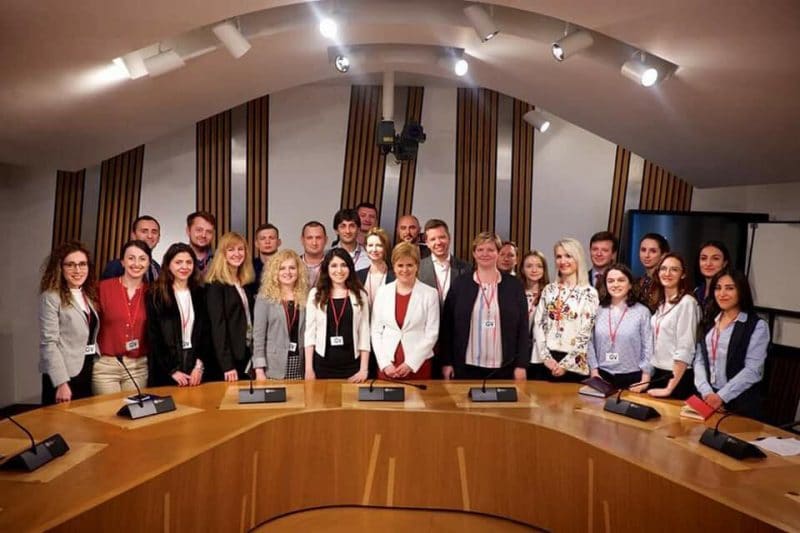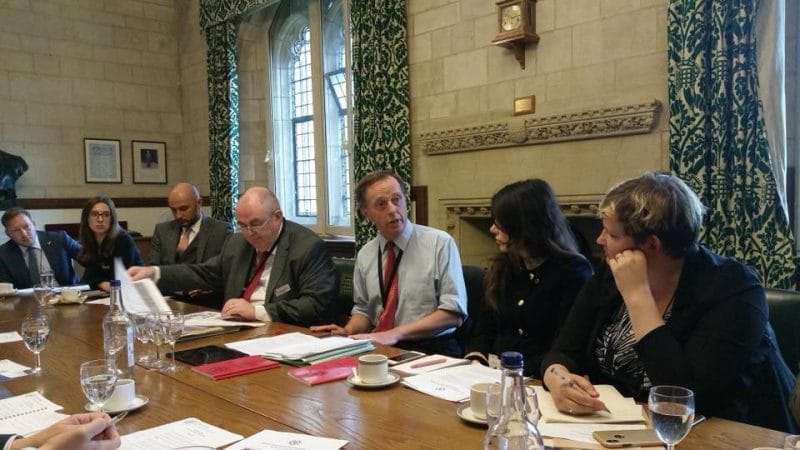
The John Smith Trust Wider Europe Fellowship is a 4-week residential program in the United Kingdom (UK) for European professionals in all fields. The program centers on the development of an Action Plan, a piece of work or public policy issue the fellow wants to impact. Action Plans can be in any field, but they should promote the Rule of Law, good governance, and social justice. The program includes workshops and interactions with high-ranking UK officials in fields like law, journalism, and politics. One-on-one mentoring, visits with UK experts in fellows’ fields, and organized professional development meetings help fellows leave prepared to make a difference in their communities through the implementation of their action plans.
We talked to Maryia Sadouskaya-Komlach, a recent John Smith Trust Wider Europe Fellow, to learn more about her fellowship experience!
1. What inspired you to apply for the John Smith Trust Wider Europe Fellowship?
The John Smith Trust Wider Europe Fellowship provides a unique opportunity to learn how the rule of law works in the United Kingdom, learn about the current political and social situation in other fellows’ countries, and to develop leadership skills. When I saw the call for applications, I realized that this was my dream fellowship: it allowed me both to take a better look at a country currently undergoing immense changes due to Brexit and simultaneously to test my knowledge and understanding of how things work in the EU Eastern Neighbourhood. Checking the programme’s alumni, I saw some familiar names and faces, and that gave me additional inspiration because I knew those people as accomplished professionals. To sum up, I applied with my eyes and mind open to look, learn, and grow in my understanding of people and the decision-making processes both in the UK and in my home region.
My action plan was to learn how freedom of expression and resilience to disinformation is developed in the UK and what parts it could be applied to the Eastern Partnership countries and Russia. Then, I wanted to find a way to apply it in my daily work for the benefit of independent media in the region. Through a range of individual meetings and public discussions, I got a much deeper understanding of Great Britain’s system of checks and balances in the freedom of expression field and established valuable contacts that will help me in my future work.
2. What have been some of the most eye-opening moments during your fellowship?
After spending almost a month in the UK, something that stood out to me was the contrast in decision-making processes between Scotland and England. In Scotland, the discussions about leaving the EU were very detailed and deep, while in Westminster, the approach was more generalized. For instance, in Scotland, we were introduced on a very advanced level to issues related to the transfer to the UK of some powers that were initially under EU’s general policy. The Scottish side explained to us some difficulties in implementing this, such as whether London or Edinburgh should be in control of certain areas like fisheries, and why it was important for Scotland that agreement on devolution be kept. However, for London-based decision-makers, that was a rather secondary issue. No one mentioned it as a real problem (despite the fact that Scottish MPs even performed the walk-out during our stay there), and the attitude was much more light-hearted. In a way, I could make some comparisons of this to experiences in my own region, where smaller counties are often overlooked by big capitals who tend to be immersed in their internal political debates. That reminded me that in important situations, certain political and economic aspects for small countries like Belarus (although we are independent, we are in a union state with Russia) are very often not the first or even second in the agenda of global powers, who tend to deal with Moscow and listen to Moscow’s understanding of the situation. That also is reflected in the international media coverage of my region.
At the same time, I also grew in my understanding of political and civil servants in the EU Eastern Neighbourhood region. The other fellows in my group represented Armenia, Azerbaijan, Georgia, Moldova, Ukraine, and Russia. I spent many hours learning more about the situation there by listening to my peers’ questions and discussions. The leadership training part of the programme was also something that helped me a lot – I reevaluated my own approach to my work at a European not-for-profit organization and drafted a personal development plan with mentors who helped me identify ways I can continue to grow as a leader. For instance, I realized that I need to better distinguish between leadership and management in my work, to be more sensitive to different learning styles of colleagues and to re-prioritise my activities in order to bring the best value to my organisation.

3. What tips would you give others applying to the John Smith Trust Wider Europe Fellowship?
Many professionals may think that it is very difficult to set aside a whole month to participate in a fellowship like this. If you are in doubt, just remember that the contacts and knowledge received during the fellowship will be very important for your developing career. Share as much as possible about your professional plans with the programme’s staff during your final interview, as this will help them plan your attachments programme in the most beneficial way for you.
Additionally, it is very important to have a clear idea of your Action plan – steps that you are going to take after graduating from the programme. Ideally, during the fellowship, both group and individual meetings should contribute to the goal that you have put into your plan. Think about it really well, and your chances to be selected will definitely rise!
Maryia Sadouskaya-Komlach is a media analyst and journalist with over 15 years of professional experience. Currently, she works as a programme coordinator at Free Press Unlimited (the Netherlands). She has worked in Belarus, Poland, Belgium, and France and advised the European Endowment for Democracy on its 2015 Feasibility Study on Russian-language Media Initiatives. She holds a Master’s degree in Political Journalism from Columbia University. Her Action Plan developed within the John Smith Trust Wider Europe Fellowship aims to contribute to a more free and responsible media in the Eastern Partnership, including her native Belarus, by increasing access to more balanced and reliable Russian language information in these countries.
© Victoria Johnson 2018, all rights reserved